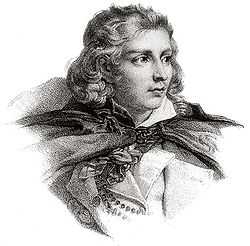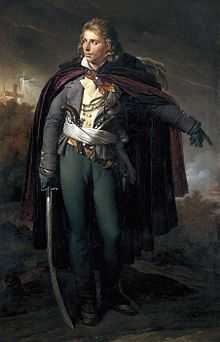Jacques Cathelineau

Jacques Cathelineau (January 5, 1759 – July 14, 1793), nicknamed le Saint d'Anjou ("the Saint from Anjou"), was a French Vendéan insurrection leader during the French Revolution. His grandson, Henri de Cathelineau, was an officer in the 1870 Franco-Prussian War.
Life
Early life
Born at Le Pin-en-Mauges, in the lands now forming the département of Maine-et-Loire, he became well known in Anjou, a region over which he travelled as a peddler and alleged dealer in contraband goods. He was a devout Catholic, and supported the Church's traditional role in French society. His great physical strength, charisma, and piety enabled him to command the respect of his fellow Vendeans.
In the first years of the Revolution, Cathelineau joined the numbers of Vendean peasants disgusted by the Civil Constitution of the Clergy, the draft laws, and the execution of King Louis XVI of France. He collected an army of peasants and waged a private war against the government of the First French Republic.
Republican propagandists and their modern sympathizers have alleged that the revolt was provoked by the exhortations of Roman Catholic priests and Royalist émigrés.
Rebellion
Cathelineau learned of the March 10, 1793 rising against the National Convention in Saint-Florent-le-Vieil. He organized a battalion of peasants and captured the château of Jallais, where he seized a cannon— known to the Vendéans as "The Missionary"— and then in quick succession took the towns of Chemillé, Cholet, Vihiers and Chalonnes.

As the war developed, the Vendeans became incensed by the massacres and atrocities committed by the revolutionaries on both Catholic clergy and their fellow Vendeans. Cathelineau's troops began committing reprisals, something from which they had previously refrained.
End
Meanwhile, Cathelineau's troops increased, and he combined with the other Vendéan chiefs, such as Jean-Nicolas Stofflet and Maurice-Louis-Joseph Gigot d'Elbée, taking the towns of Beaupréau, Fontenay-le-Comte, and Saumur. The first successes of the Vendéans were due to the Republicans having not expected an insurrection. When the resistance to the insurgents became more serious, differences arose among their leaders. To avoid these rivalries, it is thought that Cathelineau was named generalissimo of the rebels, although his authority over the undisciplined troops was not increased by the new office.
In June 1793 the combined Royalist forces stormed Nantes. Cathelineau had entered the town in spite of the resistance of General Jean-Baptiste Canclaux - when he was killed by a sniper. The Vendéan army was defeated and soon divided into factions. Numerous relatives of Cathelineau also perished in the war of Vendée and the reprisals that followed. The remainder of his family was ennobled under the Bourbon Restoration.
References
 This article incorporates text from a publication now in the public domain: Chisholm, Hugh, ed. (1911). Encyclopædia Britannica (11th ed.). Cambridge University Press In turn, it cites as references:
This article incorporates text from a publication now in the public domain: Chisholm, Hugh, ed. (1911). Encyclopædia Britannica (11th ed.). Cambridge University Press In turn, it cites as references:
- Jacques Cretineau-Joly, Histoire de la Vendée militaire
- Célestin Port, Vie de J. Calhelineau (1882); La Légende de Cathelineau in the review La Révolution française, vol. xxiv; Les Origines de la Vendée (Paris, 1888, 2 vols.); Dictionnaire Historique, Géographique et Biographique de Maine-et-Loire (1874–1878, 3 vols.)
- Théodore Muret, Vie populaire de Cathelineau (1845)
|